first clinic is under our belts
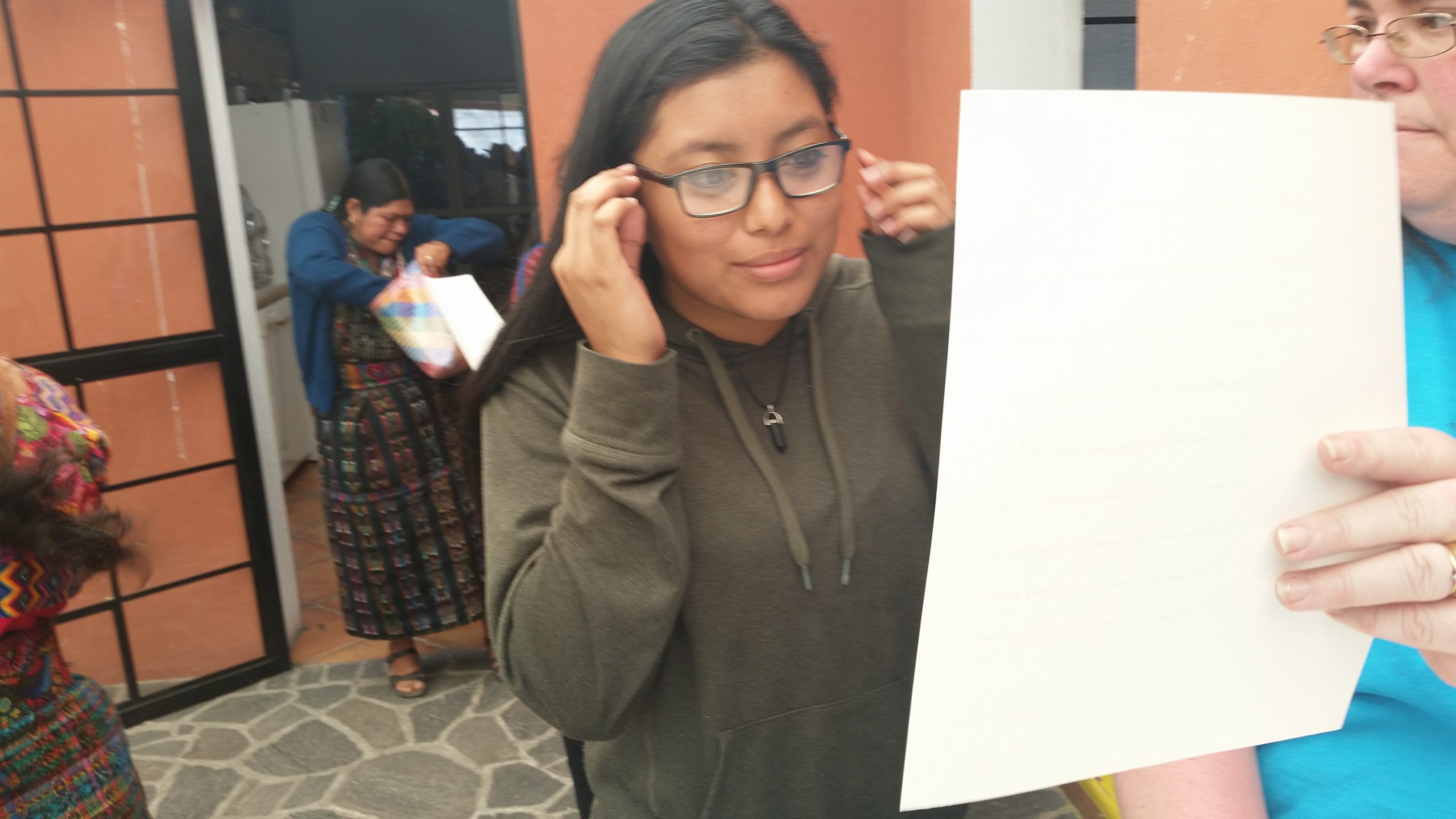
This morning our team woke up and enjoyed a healthy breakfast and then made our way to the clinic where we would distribute hearing aids, reading glasses and tooth brushes/toothpaste. I like to refer to it as our hearing, vision and dental clinic. Of course, none of us are medical professionals, but we tried our best to be professional as if we were.
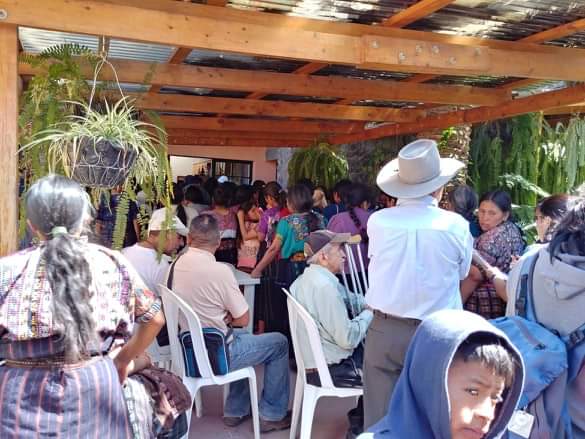
The clinic was supposed to start at 9am and go to 4pm or until the supplies ran out. We arrived at 8:30 with suitcases full of the items to be donated. When we arrived at the clinic’s gate, there was already a huge crowd of people. I spotted my friend Dina who had gathered 65 women together to be checked for appropriate eyeglass magnification and, for some, also a hearing aid. The 65 women are members of a fair trade weaving cooperative. This group of artisans have been working for 30 years+ at their craft, and now they are having problems seeing close, making it difficult to see and count the threads for their weavings.
Those 65 were only part of the group gathered in a crowd waiting to get items needed. A half hour before opening, there were over 90 people assembled. Doctor Louis at the clinic said that there were people knocking on the door as early as 6am.
We entered the building after barreling our suitcases through the crowd and separated our donations on tables in the back of the clinic. Readers were separated by magnification, hearing aids were loaded with batteries, and toothbrushes and paste were unpacked.
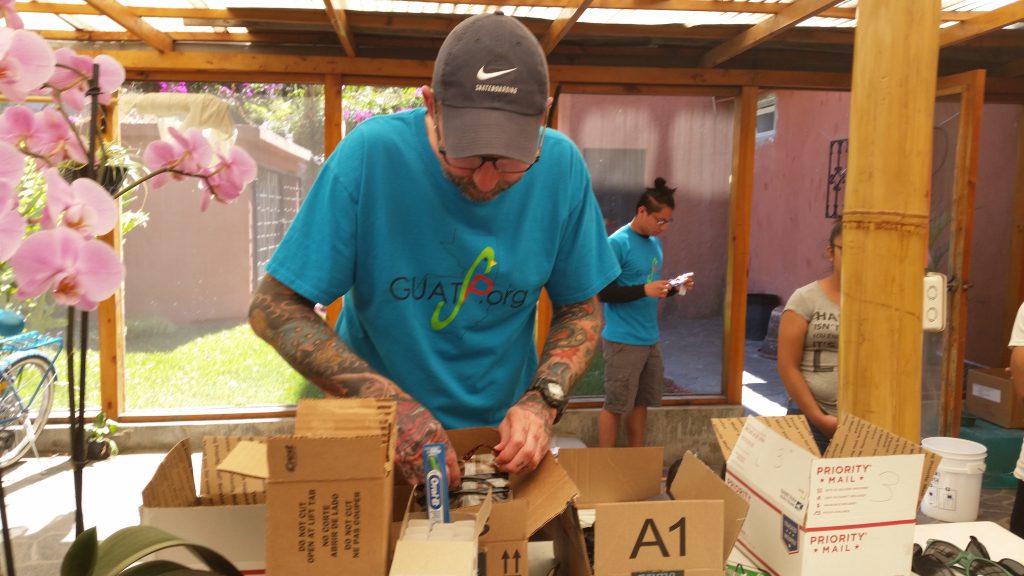
When Doctor Louis and the Kaqchikel translator, Silvia, invited the first ten people into our distribution space, we handed out our first 10 hearing aids. The group of people were given full instructions, and they were properly fitted. That process, however, took quite a while. Doctor Louis kept surveying the crowd outside, people growing weary of the wait. People were shoving each other, fighting to get to the front of the line. The desperation was sad. There are so many people to help! They even had to barracade the door to keep people from entering before it was their turn!
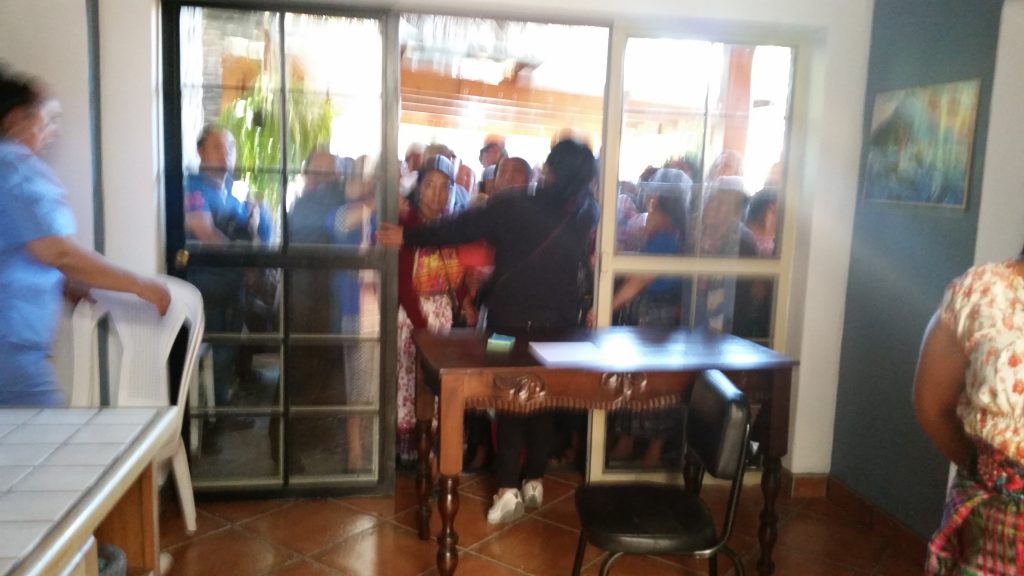
Finally, people were told to line up again and were given numbers so that they are processed in order. Doctor Louis said that the only way to process the restless crowd would be to simply hand out the hearing aids without explanation or fitting — to get people in and out as quickly as possible.
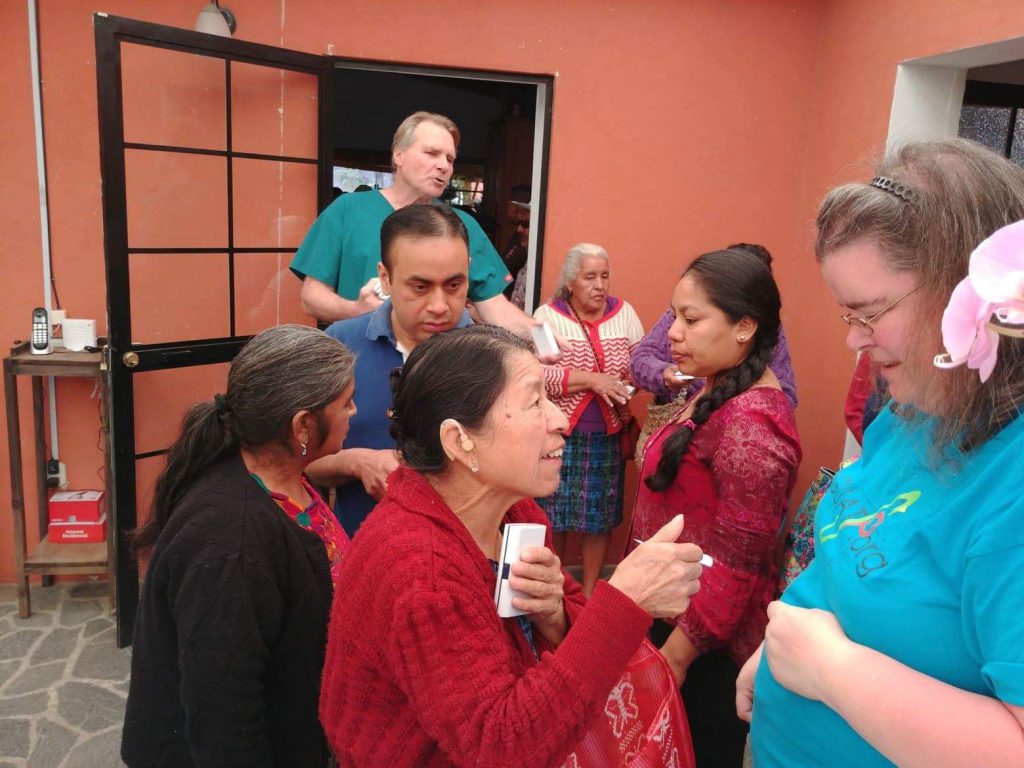
Before we knew it, we had handed out all 100 hearing aids in just 40 minutes. Many, many people were turned away, including many of Dina’s artisan friends who were in front of the original line before it was re-numbered.
When the hearing aids were all distributed, we focused on glasses. Many elderly women were assembled, many with children or grandchildren that accompanied them to the clinic. Unfortunately, Doctor Louis turned many of them away, as he quickly determined that they suffered from cataracts and complications of diabetes, and likely would not benefit from reading glasses.
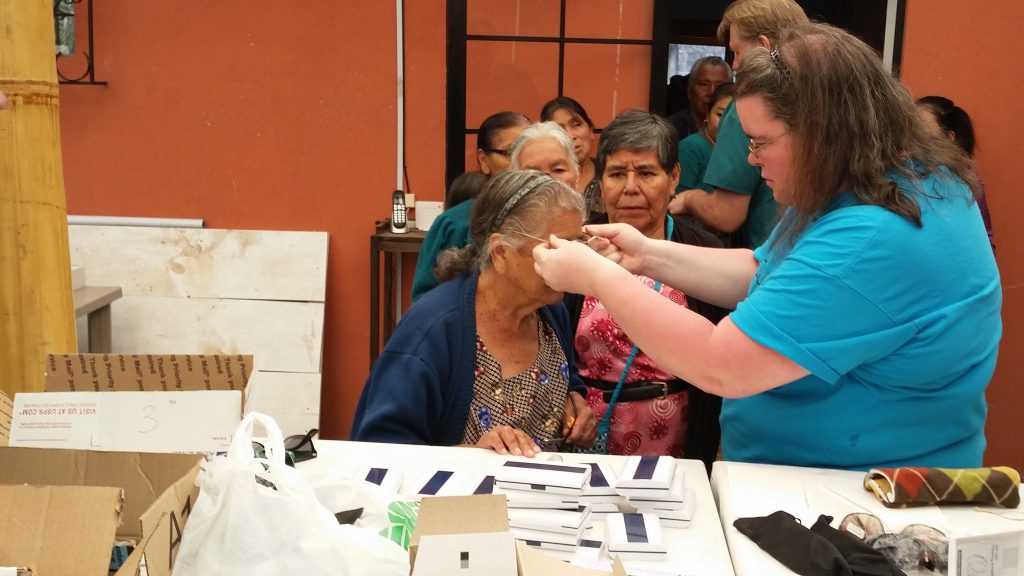
With the remaining crowd of hopeful recipients, we used the vision charts that we had brought to aid us in determining the appropriate magnification. We served men and women and children aged 1.5 to 100, I’m guessing. There were a few students, many moms, and lots of grandparents. There were even two police officers that stopped. By the time they arrived, most of the glasses had already been handed out. The only magnifications that were left were 2.00 and 2.50. That size worked for the one officer, but the other left with none.
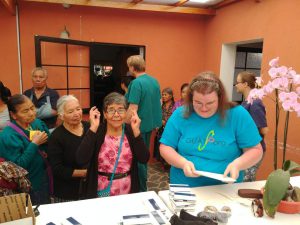
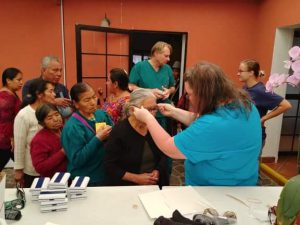
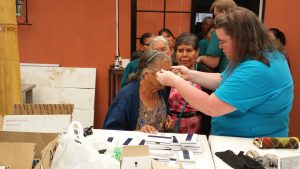
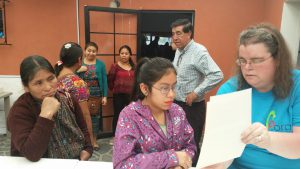
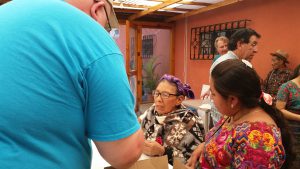
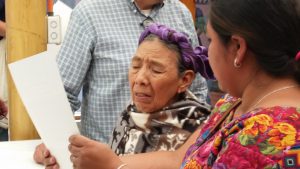
In addition to the elderly with more serious vision problems than we could help, the two that touched me the most were both very young kids that both had a lazy eye. Young mothers brought their children to the clinic, hoping that they would receive some care to help with their vision issue.
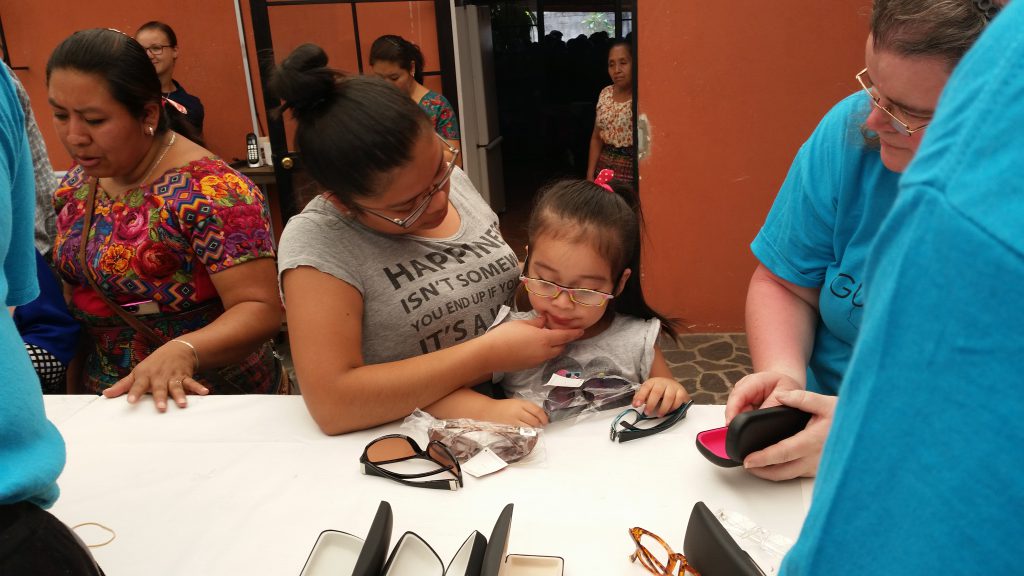
Our entire event was completely finished by lunchtime. We cleaned up the packing schrapnel from all the glasses, hearing aids, boxes of toothbrushes and toothpaste and then walked to Deli Jasmin for lunch. We had a very nice meal and then returned to the clinic to retrieve our luggage we left behind.
With the crowd dissipated, we had a moment to review the events of the day and plan for improvement should another one take place. Our takeaway was that it was better to focus on just one thing, as it would be easier to serve people in order if they were only waiting in one line. As it was, if a person needed both glasses and a hearing aid, they could not wait in two lines at once. And, Doctor Louis said there were four or five other groups throughout the year that bring glasses, but we were the first that EVER brought hearing aids. He loved that we brought those! It made us happy that hearing aids could be our “niche”.
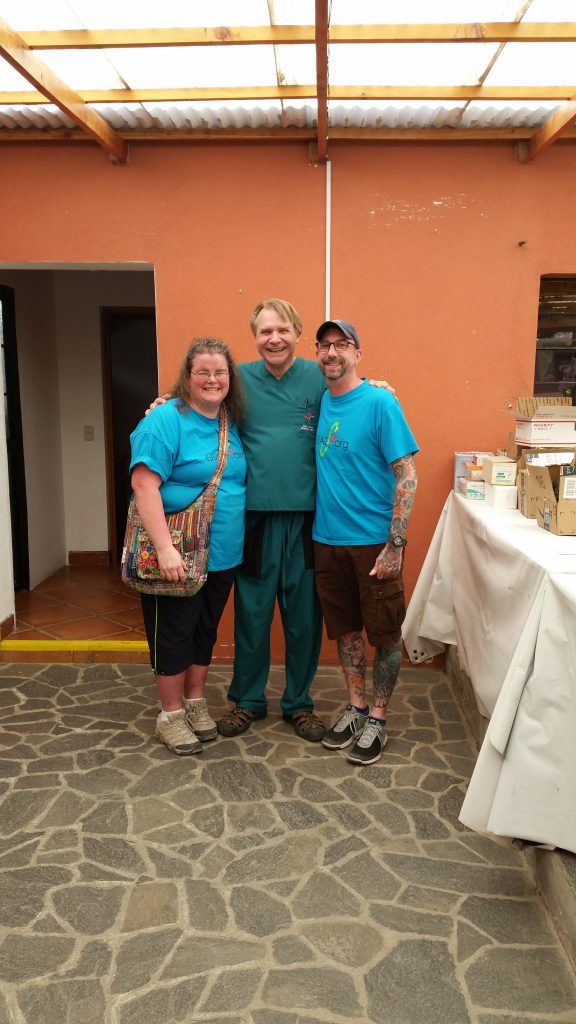
We left feeling like we would focus our energies on hearing aids!
As we returned to our rental home, we called Dina and arranged to have her visit us. We were supposed to deliver an item to her, and the clinic was the supposed “exchange” site, but because of the busy nature of the event, it never happened. Dina brought her son by bike and joined us for a little conversation. She had some excellent feedback regarding our clinic and suggestions for how it could be made better. She also, unfortunately, pointed out some unfairness in the process and how the recipients were not served in the order in which they arrived. Sadly, her employer paid the transportation costs for all 65 women to get to the clinic and some left with only toothpaste — not what they needed most nor what they expected.
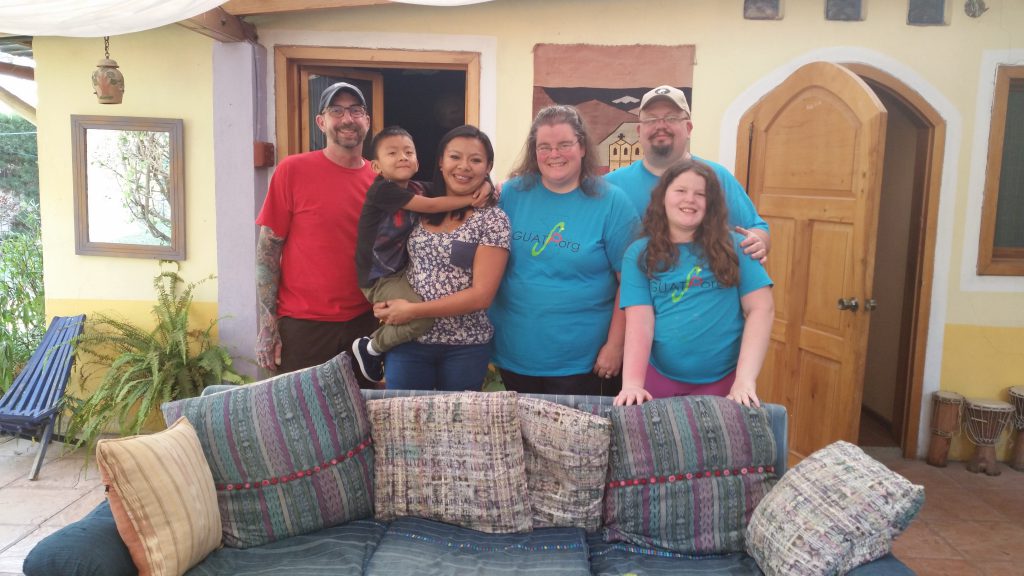
We promised Dina at that moment that we would absolutely fill the need for all women that did not receive glasses, and we would try our hardest to raise the funds for hearing aids to all that need them. We left her with a copy of our magnification determination charts and asked her to record the data necessary so we can bring exactly what is needed on our next trip in August.
We ended the day with a dinner at Pollo Campero, the Guatemalan version of Kentucky Fried Chicken. We were accompanied by a young man named Salvador, a friend that Trent made during one of his previous trips. Salvador is a 17 year old young man that is working to complete 4th grade. He speaks some English, and is very hard-working. He studies Monday through Friday, and works on the weekends making and selling bracelets. He revealed to us that when the school year ends in October, he will start a walking trek to the United States. He know no one in the United States, but he sees no other way to survive. He doesn’t understand the risk. He stated that his plan was to stay eight years, as that is the length of time he thought it would take for him to earn an amount of money that he would be able to lift his family out of poverty. He said he wants to return to Guatemala, and doesn’t plan to stay in the U.S. We wish him well, but know that his journey will be very difficult, perhaps fatal.

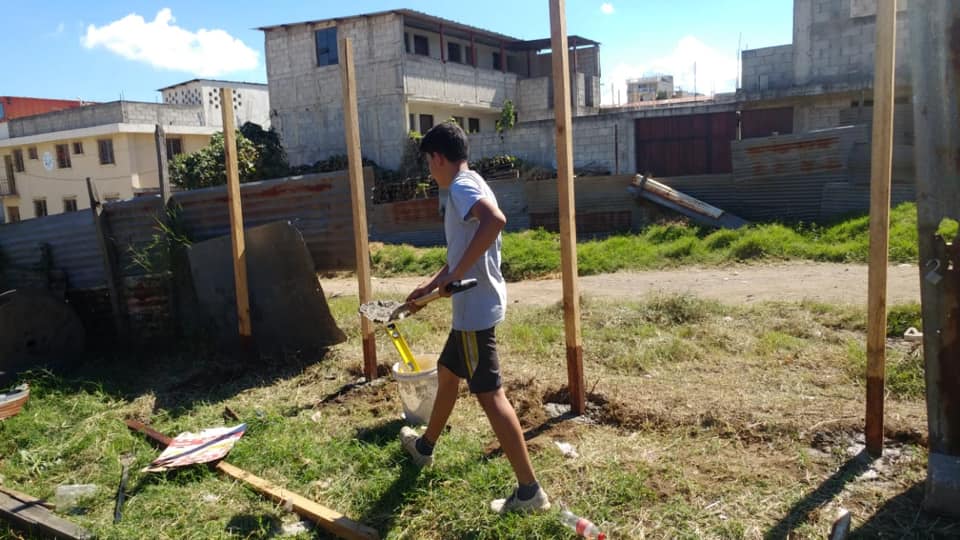
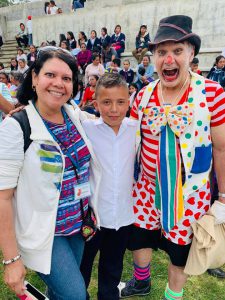 The “right” opportunity arose when I learned about a travel opportunity for adoptive families which would include volunteer work and cultural sightseeing. Being members of that team had a profound impact on me, Lillian and Andrew. Not only were we able to make a real connection to our son’s birthplace, but we met incredibly warm and generous people, all of whom we now consider to be a part of our “family.” In addition to the volunteer work I shared with the Team, I also was able to “give back” by performing as my alter ego, “Farfel the Clown” at a barbecue for children of The Backyard School. It will remain one the proudest and happiest memories of my life.
The “right” opportunity arose when I learned about a travel opportunity for adoptive families which would include volunteer work and cultural sightseeing. Being members of that team had a profound impact on me, Lillian and Andrew. Not only were we able to make a real connection to our son’s birthplace, but we met incredibly warm and generous people, all of whom we now consider to be a part of our “family.” In addition to the volunteer work I shared with the Team, I also was able to “give back” by performing as my alter ego, “Farfel the Clown” at a barbecue for children of The Backyard School. It will remain one the proudest and happiest memories of my life.
Congratulations on your first eye glass/hearing aid event. Nothing but kudos to you all for doing such very important work. I realize you would have liked to help every single person in line, but the story of the starfish on the beach came to my mine. Bless you all.
Hi Donna! Thanks for your comment. I love the starfish story and I always try to keep it in mind because it does feel like there are a million starfish in Guatemala.